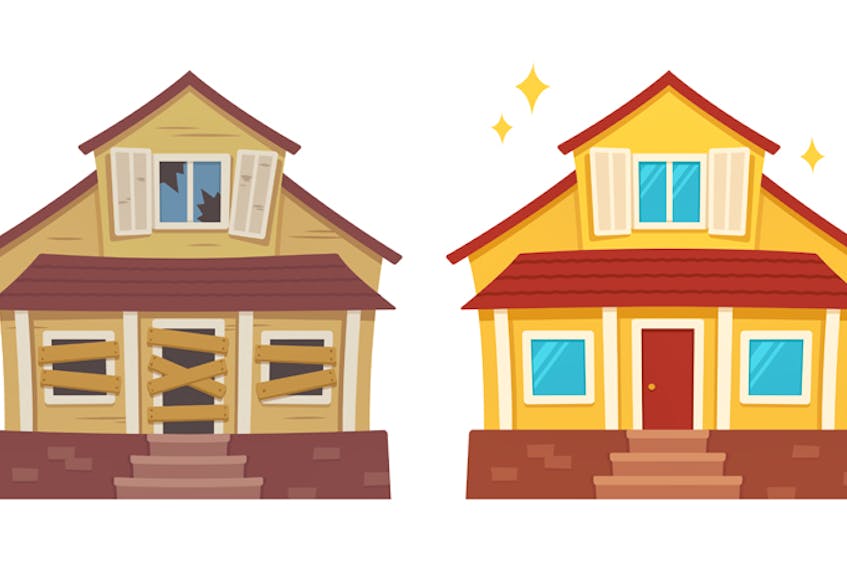With the increasing popularity of renovation and house flipping shows, many buyers dream about purchasing a fixer upper and then, five weeks later, moving into their fully renovated dream home. Now, back to reality. Not all “projects” are the same. Here are a few tips to consider if you are shopping for a fixer upper.
Location Location Location
Buying a fixer upper is a great way to buy a larger home or get into a great neighbourhood that you otherwise might not be able to afford. Working closely with your Realtor and reviewing past sales and pricing in various neighbourhoods allows you to pin-point the best opportunities to invest your time and money and turn a profit. Your Realtor will also be able to advise you on up and coming neighbourhoods and property development projects that will have positive or negative effects on your home’s resale value.
Cost of Renovations
A thorough home inspection is always recommended and is worth the money. A good home inspector will uncover any major problems that may be too large for your budget or your comfort level. It will either confirm that you are making a good financial investment or at the very worst, it will allow you to back out of the deal.
It is also a good idea to have a qualified contractor go through the house and provide you with an estimate for the work that needs to be done. Houses that need significant improvements can include many hidden costs, such as major repairs to the electrical or plumbing systems, structural or foundation work and/or upgrading the heating system, all of which can be expensive improvements and don’t usually raise the value of the house by the cost of the investment — compared to homes that require simpler cosmetic upgrades such as a new kitchen or bathroom, which are definitely more lucrative improvements, as well as upgrades to light fixtures, paint or flooring.
The layout should flow. Moving walls can prove to be expensive and even impractical. Opening up a wall between the kitchen and dining room makes sense, but if you have to reconfigure or completely relocate the kitchen, consider the extra costs of moving walls, plumbing and electrical.
The Budget
One of the most challenging aspects of buying a fixer upper is paying for the renovations. After paying the down payment and associated closing costs, there is sometimes not much left over for improvements. One popular option available to most buyers is a “purchase plus improvements” mortgage. This allows you to finance your renovations upfront. Your renovation costs are disbursed once your renovations are complete and your repayment is included in your monthly mortgage payments, making the cost of renovations easy and affordable. Note, there are limitations to the amount of funds that can be borrowed and the type of improvements approved by lenders. Talk to your mortgage broker or Realtor for details.
Having a contingency fund set aside is also advisable to pay for those unforeseen problems that can (and usually do) arise during a renovation, typically 10 to 20 per cent of the entire renovation budget.
It is usually most cost-effective when homeowners can do the work themselves. But if you are not the handy type be prepared to spend much of your time overseeing tradespeople to ensure the project stays on time and on budget. Otherwise, the money you saved buying a fixer upper could be gone if the project goes over budget due to costly mistakes or delays.
Set a Schedule
Do you plan on living in the house while you renovate or do you intend to renovate before you move in? Although living onsite is more economical, it can be quite unpleasant for extensive renovations and even delay the timeline. If you do decide to live onsite, be prepared for dust, and lots of it. It is a good idea to place as much of your furniture and belongings as possible in storage. For safety reasons, if you have small children or pets, living onsite may not be an advisable option.
Consider breaking up the renovation into phases to spread out the costs of the renovation. This can make it more affordable. Avoid setting renovation deadlines around holidays such as Christmas or vacations. It will only add to your stress if the project is delayed.
Expect the Unexpected
Even the most well planned renovations can experience problems. Your renovation may uncover even bigger problems that you had originally not thought of or budgeted for. You may be living in a construction zone for months longer than expected. Despite being disruptive and stressful, a major renovation can be very rewarding and satisfying endeavour when complete, if done properly.
Patti Ross is a full-time professional Realtor® and home improvement expert helping people buy, sell and improve their homes in HRM for more than 10 years.









